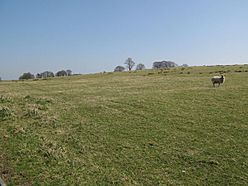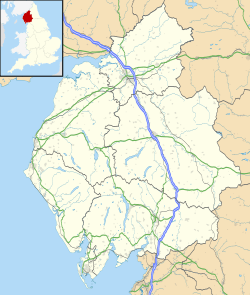Milecastle 50 facts for kids
Quick facts for kids Milecastle 50 |
|
|---|---|

The site of Milecastle 50
|
|
| Type | Milecastle |
| Place in the Roman world | |
| Province | Britannia |
| Structure | |
| — Stone structure — | |
| Size and area | 18.3 m × 23.2 m (0.04 ha) |
| Location | |
| Coordinates | 54°59′14″N 2°36′58″W / 54.987165°N 2.616077°W |
| County | Cumbria |
| Country | England |
Milecastle 50 (High House) was a small fort, called a milecastle, that was part of Hadrian's Wall. This famous wall was built by the Romans in ancient Britannia (which is now England).
Contents
What is Milecastle 50?
Milecastle 50 is located west of the Birdoswald fort. It sits about 1,391 meters (about 0.86 miles) west of Milecastle 49. It is also about 1,501 meters (about 0.93 miles) east of Milecastle 51. Today, you can't see much of it. It mostly looks like a slightly raised area in a field that has been plowed.
Digging Up the Past: Excavations
Archaeologists dug up Milecastle 50 in 1911 to learn more about it. They found that the milecastle measured about 18.3 meters (60 feet) from east to west. It was about 23.2 meters (76 feet) from north to south.
The milecastle was built with strong stone walls. These walls were connected to the main part of Hadrian's Wall on both sides. It also had special gates, known as Type III gateways.
This stone milecastle actually replaced an older one. The first milecastle in this spot was called Milecastle 50TW (High House). It was part of the earlier Turf Wall version of Hadrian's Wall. This older milecastle was about 200 meters (656 feet) south of the stone one.
Milecastle 50TW was dug up by F. G. Simpson and I. A. Richmond in 1934. It had walls made of turf (like thick grass blocks). It also had a wooden tower on its north side. During the dig, they found a piece of wood with an inscription (writing) on it. This writing told them that the milecastle was built when Aulus Platorius Nepos was in charge.
Small Towers: Associated Turrets
Every milecastle along Hadrian's Wall had two smaller watchtowers nearby. These towers are called turrets. They were usually placed about one-third and two-thirds of a Roman mile to the west of the milecastle. Soldiers from the milecastle would have guarded these turrets. The two turrets connected to Milecastle 50 are known as Turret 50A and Turret 50B.
Turret 50A
Turret 50A (High House) was also excavated in 1911. Part of this turret is now buried under a road. The other part can still be seen as a small mound of earth at the edge of a field. This stone turret also replaced an earlier one, called 50A TW. The older turf wall turret was taken down when the stone wall was built.
Turret 50B
Turret 50B (Appletree) was another turret dug up in 1911. You can't see any remains of it on the surface today. However, there's a slight rise in the south wall of the road. This rise shows where the road goes over the turret's south wall. Like Turret 50A, this stone turret replaced an earlier turf wall turret (50B TW). That older turret was removed when the stone wall was constructed.
 | Lonnie Johnson |
 | Granville Woods |
 | Lewis Howard Latimer |
 | James West |


